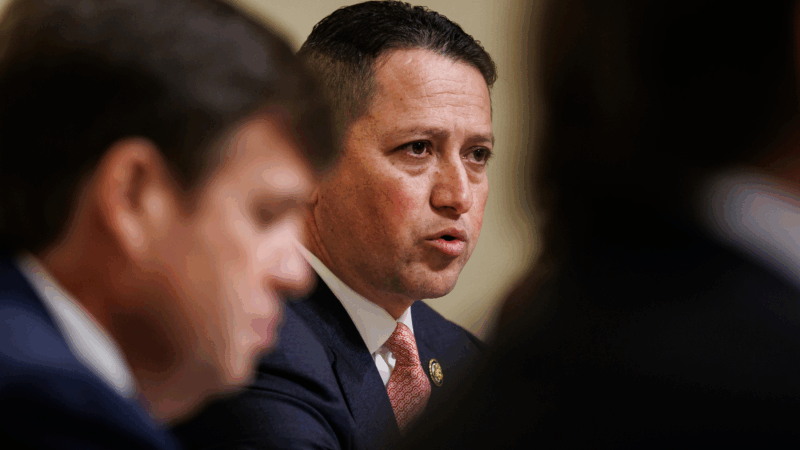Tipper Gore, Twisted Sister and the fight to put warning labels on music
Dee Snider stands out prominently in a room full of suits and ties. The singer of the heavy metal band Twisted Sister is sporting tight jeans and a cuttoff denim vest, and has long, curly blonde hair.
The date is Sept. 19, 1985, and Snider, 30, is in front of Congress to oppose adding warning labels to albums with explicit lyrics. His band’s biggest hit, “We’re Not Gonna Take It,” is one of the songs that has stirred up debate in Washington, D.C.
Snider begins his testimony by clarifying any misconceptions about his appearance. He describes himself as a faithful Christian who does not consume alcohol or use drugs.
He argues that adults already have the necessary information when buying music for their children.
“As a parent myself and as a rock fan, I know that when I see an album cover with a severed goat’s head in the middle of a pentagram between a woman’s legs, that’s not the kind of album I want my son to be listening to,” he says.
Snider and several other musicians, including guitarist Frank Zappa and country singer John Denver, are taking a stand against the Parents Music Resource Center, or PMRC. It’s a committee co-founded by Tipper Gore, the wife of Senator — and later Vice President — Al Gore.

The PMRC urges the music industry to take responsibility for its influence on kids and teens. In her testimony, Tipper Gore pushes back against claims that the committee wants to censor content.
“Labeling is little more than truth in packaging, by now a time-honored principle in our free enterprise system,” Gore says during the hearing. “And without labeling, parental guidance is virtually impossible.”
Witnesses for the PMRC present slideshows of provocative album art and read objectionable lyrics aloud.
A pastor named Jeff Ling alleges that some teenagers have died by suicide after listening to bands like AC/DC.
“Many albums today include songs that encourage suicide, violent revenge, sexual violence and violence just for violence’s sake,” Ling says.
Gore and the PMRC eventually achieve their goals. Two months after the hearing, they strike a deal with the recording industry, which leads to the placement of stickers reading, “Parental Advisory: Explicit Lyrics” in the bottom-right corner of certain albums.
As a result, stores like Wal-Mart stop carrying any records that bear this label, which some in the music industry nickname the “Tipper sticker.” Interestingly, artists ranging from Earth, Wind & Fire to Ice-T claim that these warnings actually boost their sales.
“The sticker on the record is what makes ’em sell gold,” Ice-T says in his 1989 song “Freedom of Speech.”
In 1987, Gore appears on NPR’s Fresh Air to discuss parental control of music. Host Terry Gross questions Gore on the practical effectiveness of labeling.
“I just don’t know of a lot of parents who do the rock and roll shopping for their teenagers,” Gross says. “Don’t they just drop them off and let the children shop?”
“Sure, some of them do, and some of them probably don’t,” Gore responds. “I mean, I don’t.”
Parental advisory labels are still present today, although they remain voluntary. It’s up to record labels whether an album includes a small black-and-white rectangle on the cover.
But these days, buying music — by kids or their parents — has largely been replaced by streaming, which accounted for 84% of U.S. music industry revenue in 2023. Whether parental advisory stickers still serve as the clear moral guideposts they were meant to be remains difficult to determine.
As Mississippi waits to spend opioid settlement funds, children and families suffer
Mississippi will receive more than $400M to fight the opioid epidemic. So far, officials haven't directed it toward programs that support addiction recovery.
Alabama’s new state climatologist takes the reins
The controversial John Christy is retiring as Alabama’s state climatologist. Lee Ellenburg now assumes the role and is already making a few changes, including declaring that climate change is real and caused by humans.
Colossal Biosciences breeds controversy while trying to revive mammoths
A Texas biotech company is trying to bring mammoths and other extinct creatures back to life. The science is as intriguing as the ethical questions are thorny.
Mundane, magic, maybe both — a new book explores ‘The Writer’s Room’
Why are we captivated by the spaces where where authors write? Katie da Cunha Lewin set out to explore "The Hidden Worlds That Shape the Books We Love."
GOP Rep. Tony Gonzales heads to a runoff in Texas amid a new ethics probe in the House
Texas Republican Rep. Tony Gonzales has faced increasing pressure from his party to resign or drop out of his race after allegations of an affair with a staffer.
Satellite images show Iran school strike hit more targets than earlier reported
The images suggest that precision munitions struck other buildings, including a clinic that was also inside the complex.






